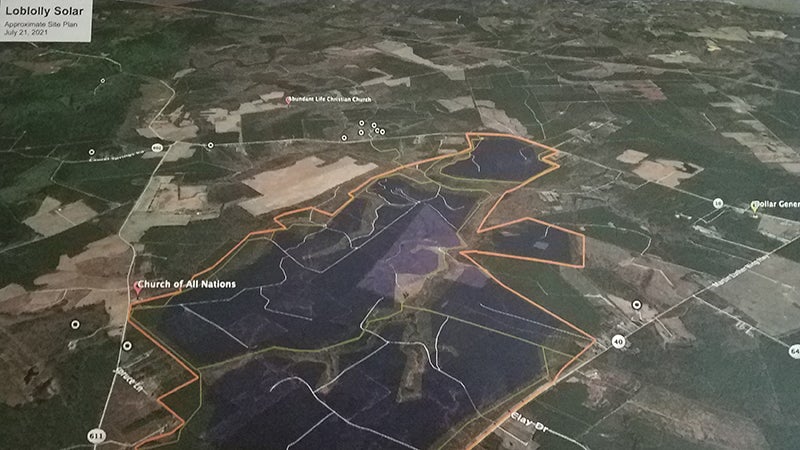Surry planners again reject Spring Grove solar farm
Published 8:13 pm Wednesday, March 30, 2022

- This site plan shows the proposed project area for the Loblolly Solar facility that would have been located at the intersection of routes 10 and 40 in Surry County's Spring Grove community. File photo
Editor’s note: This story has been updated to correct the location of Primergy Solar’s headquarters.
Opponents of a proposed 150-megawatt solar farm in Surry County’s Spring Grove community weren’t swayed by its developer’s offer of monthly rebates on their electric bills.
Surry’s Planning Commission, after holding a second public hearing on the matter, is still of the opinion that the project would conflict with the county’s comprehensive plan.
“If you’re going to pay my whole entire light bill … I still wouldn’t go for it,” said Spring Grove resident Mabel Wilkins at the March 28 hearing. “The residents of Spring Grove do not want this. We have been saying from 2021, 2020 … we don’t want this.”
Charlottesville-based Hexagon Energy submitted plans to the county in 2020, and has revised its application four times over the past 18 months. The “Loblolly Solar” facility, as it’s been named, would be sited on 900 acres of timberland at the intersection of Routes 10 and 40.
The commissioners had voted against an earlier version of Hexagon’s proposal last fall, citing a provision in the county’s comprehensive plan that states solar farms are to be “sited as close to electric transmission lines as possible.” Hexagon’s plans call for just under two miles of utility easements to connect the solar farm to the existing power grid.
Following the first vote, Hexagon amended its application to include two additional parcels, sending the matter back to the Planning Commission for a new vote before it heads to the Surry Board of Supervisors for a final decision.
If approved, the project would contribute more than $16.3 million in tax revenue to Surry County over its 40-year lifespan – with an estimated payment of $344,279 in its first year of operation.
As an added incentive, Hexagon and its California-based construction partner Primergy Solar in February proposed the rebate program, which company officials are calling the first of its kind in the United States.
The program would entail partnering with Dominion Energy and local electric cooperatives. Anyone living adjacent to the proposed solar farm or across the street from it would be eligible for monthly discounts on their power bills. Hexagon has proposed contributing $60,000 per year toward the rebate program.
Wilkins wasn’t the only Spring Grove resident to maintain her opposition despite the proposed rebate. Eight other area residents spoke against it at the March 28 hearing. For Sandra Jennings, her personal experience dodging equipment trucks that run to and from an existing solar farm just over two miles away outweighs any financial incentive.
“I already had my mind made up, and you almost persuaded me,” Jennings said. “However, I cannot count the times I have been run off the road by the solar trucks … You practically have to go in the ditch and stop and let them get by.”
McKinley Bailey was the sole resident to speak in favor of the project.
“I don’t see how it could adversely affect anything … . The country is in need of those types of projects because of climate warming,” Bailey said.
Hexagon officials say the 2020 passage of the Virginia Clean Economy Act, which mandates the state transition to 100% carbon-free electricity by 2050, has spurred interest among renewable-energy producers in partnering with landowners to develop solar farms.
But for Planning Commission Chairman Eddie Brock, the issue isn’t the pros and cons of solar power, but rather a question of future land use.
“We wrote in the comprehensive plan that these solar panels … would be placed within proximity of the transmission lines,” Brock said.
In his view, locating the proposed solar farm 1.75 miles from the existing transmission lines doesn’t meet that criteria.
“I almost feel like our hands are tied … . This is probably one of the best solar projects that we have,” Brock said. “ You offer a lot, but I’m looking at the comprehensive plan.”
Hexagon has requested four approvals for the project: a comprehensive plan amendment, a rezoning, a conditional use permit and a resolution declaring the proposal “substantially in accord” with the amended comprehensive plan.
The Planning Commission voted unanimously with two abstentions to recommend Surry County deny each of Hexagon’s four requests. In each vote, Commissioners Judy Lyttle and Giron Wooden abstained — Wooden citing his employment with Surry County Public Schools, given that Hexagon has offered to contribute $125,000 toward the school system for technology upgrades.





